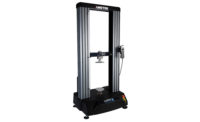
Resolution, sensitivity and flexibility are among the top considerations when purchasing a leak tester.
Last month, this column focused on the available types of leak testers, as well as supplier relationships. This month’s primer will continue with “must-ask” questions that should be answered before making a decision on a leak tester.
How important are resolution and sensitivity?
Speed and resolution should be among the major considerations when purchasing a leak tester, but they should also be viewed with caution. Speed and resolution of the complete system is a primary consideration.Resolution. When evaluating leak testers, there may be claims such as 0.0001-psi resolution. Be aware that this refers to an individual component—the analog-to-digital (A-to-D) converter stated in pounds per square inch.
While it may be true, it is simply not a useable figure. To determine the true useable resolution, the entire system must be consideredelectronics, sensors and components. Only then will there be a true picture of the system’s actual resolution.
Sensitivity. When hearing claims such as 0.01 cubic centimeters per minute leak detection, be skeptical. While it may be achievable, it may only be achievable in a few applications. As with resolution, the true testing sensitivity depends on the total system, including the part and test specifications.
Purchasing a leak tester based on exaggerated claims of resolution and speed can be a costly mistake.
I’ve heard that mass flow testing is faster, can predict leaks early and is not affected by temperature or test volume.
These claims may sound appealing, but, as the saying goes, if it sounds too good to be true, it usually is. The laws of physics have not changed.Early predictions are true only for detecting large leaks in advance of detection of the specified leak, but almost any leak tester can do this. The total cycle ensures a repeatable and reliable leak test. Anything less will cause false rejects or allow leaking parts to pass. If the goal is early detection without completing the total cycle, why have a total cycle?
All air leak testers require a pressure differential across the leak. The differential pressure causes pressure decay or flow. Both are affected by temperature and test volume size.
Mass flow-type leakage detection has made some advances in the past few years but still cannot measure up to the speed, reliability and simplicity of pressure decay.
For testing speeds equivalent to pressure decay, mass flow testing requires special configurations and attention, such as:
- Comparing the test part to a reference chamber.
- Allowing continuous air flow through the transducer.
- A second pressure transducer to ensure pressure was applied.
- Dual air pressure regulation.
- Assurance of clean, dry air.
What about system flexibility?
Leak testers must be flexible, and one or two great features do not make a reliable leak test system. Initially, a tendency is to think a go-no go tester is needed. Later, however, the importance of quantifying the results will be realized.Over time, specifications will change, new products will be added or variations to current products will occur that will require different types of testing. As requirements change and increase, solid software maintenance and documentation, good manuals and training support without hidden charges will be needed. Expanded capabilities will have to include data collection, active statistical analysis, local area network capability, bar code reading or temperature compensation.
Experienced users recognize the need for flexibility to be built in leak testers. Although this built-in flexibility may increase the initial cost of the tester, flexibility has the potential to save time and money over the lifetime of the system.
What about price?
Never buy a leak tester based solely on price. Buying solely on price may save a company several thousand dollars, but this seemingly large savings up front can actually cost big money in:- inadequate application support,
- poor performance,
- nonrepeatable results,
- continuous breakdowns,
- poor software maintenance and documentation,
- no local support,
- no telephone support,
- calibration failures and product recall,
- extra cost for training,
- extra cost for installation assistance,
- poor or inadequate manuals,
- lack of flexibility for changing needs and
- no emergency parts availability.
Tester cost cannot be analyzed by the formula that lower purchase price equals lower cost. Always consider the long-term value that will be received through years of ownership and the partnership with a successful and innovative supplier.
Uson LP (Houston) is a manufacturer of leak and flow testers. For more information, call (281) 671-2000.




